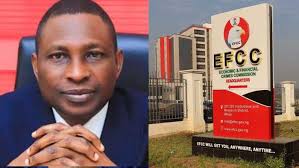
The Economic and Financial Crimes Commission (EFCC) has dismissed challenges to its legality, stating that those behind the lawsuits are feeling the impact of its anti-corruption efforts.
Sixteen state attorneys-general have filed a suit with the Supreme Court, questioning the constitutionality of the EFCC’s establishment. The states argue that the National Assembly failed to adhere to Section 12 of the 1999 Constitution, which governs the incorporation of international treaties into domestic law.
In an interview on Channels Television’s Morning Show on Monday, the EFCC emphasized its legitimacy, highlighting that its establishment followed due process in the National Assembly.
EFCC Director of Public Affairs, Wilson Uwujaren, expressed concern about the timing of the suit, given Nigeria’s corruption issues. He explained that the commission remains committed to its mandate, stressing that the EFCC has been instrumental in tackling corruption, recovering billions of naira in stolen funds, and prosecuting high-profile cases.
Uwujaren stated, “I am worried that with the corruption problem we have in this country, some people would challenge the legality of the EFCC in court. What you see playing out today is simply people who are feeling the heat of the EFCC’s work and want to derail its efforts. They see the EFCC as a threat.
“Nigerians should see through the gimmicks of those behind the suit challenging the commission’s legality. We are really shocked by what is happening. Nigerians should oppose this shenanigan because I don’t see how this country can survive without the EFCC given the corruption problem we face. Nigeria cannot do without the EFCC.
“Those challenging the legality of the EFCC are feeling the heat of the anti-graft war.”
Meanwhile, the Supreme Court has scheduled the suit by the 16 state attorneys-general for hearing on Tuesday, October 22.
Human rights lawyer Femi Falana and some civil society organizations have criticized the suit, while former Nigerian Bar Association President Olisa Agbakoba supported the challenge, claiming the EFCC was not constitutionally established.
Comments